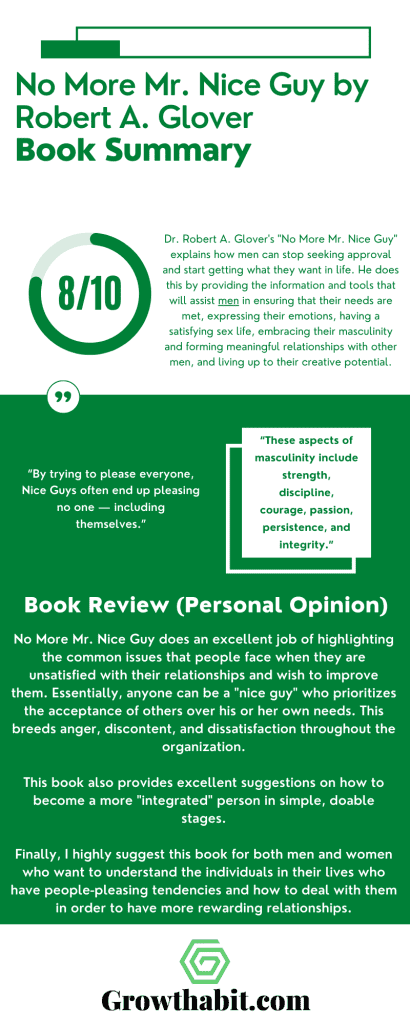Dr. Robert A. Glover’s “No More Mr. Nice Guy” explains how men can stop seeking approval and start getting what they want in life.
He does this by providing the information and tools that will assist men in ensuring that their needs are met, expressing their emotions, having a satisfying sex life, embracing their masculinity and forming meaningful relationships with other men, and living up to their creative potential.
Book Title— No More Mr. Nice Guy: A Proven Plan for Getting What You Want in Love, Sex, and Life
Author— Robert A. Glover
Date of Reading— May 2023
Rating— 8/10
What Is Being Said in Detail
No More Mr. Nice Guy does not instruct guys on how to behave badly, despite what the book’s title might lead readers to believe it does. Dr. Glover teaches men the skills necessary to develop into what he refers to as “integrated males.”
Becoming integrated means being able to accept oneself in every way, even their flaws.
An integrated man is able to accept all of the aspects of himself that contribute to his singularity, including his strength, his assertiveness, his humor, his courage, and his goal, in addition to his worries, his defects, his mistakes, his rough edges, and his dark side.
CHAPTER 1. The Nice Guy Syndrome
In this chapter, Robert Glover gives us some examples of what Nice Guys would say.
The term “Nice Guy” does not refer to a person’s actions, but rather to the fundamental views they hold concerning both themselves and the world around them.
Kind guys who have been conditioned, incorrectly, to believe that if they are kind, they would be liked, that they will have their needs satisfied, and that their life will go well.
It should be evident that this is not the case. Nice Guys can’t tell the truth, they’re always being passive-aggressive, and they have trouble setting limits.
The working mentality of the Nice Guyis as follows: “If I can hide my flaws and become what I think others want me to be, then I will be loved, and I will get my needs met, and I will have a life that is problem free.”
Going from one extreme to another is not an effective strategy for recovery from Nice Guy syndrome.
The act of breaking free from patterns of ineffective niceness does not include engaging in unkind behavior at any point in the process. Instead, it refers to the process of becoming integrated.
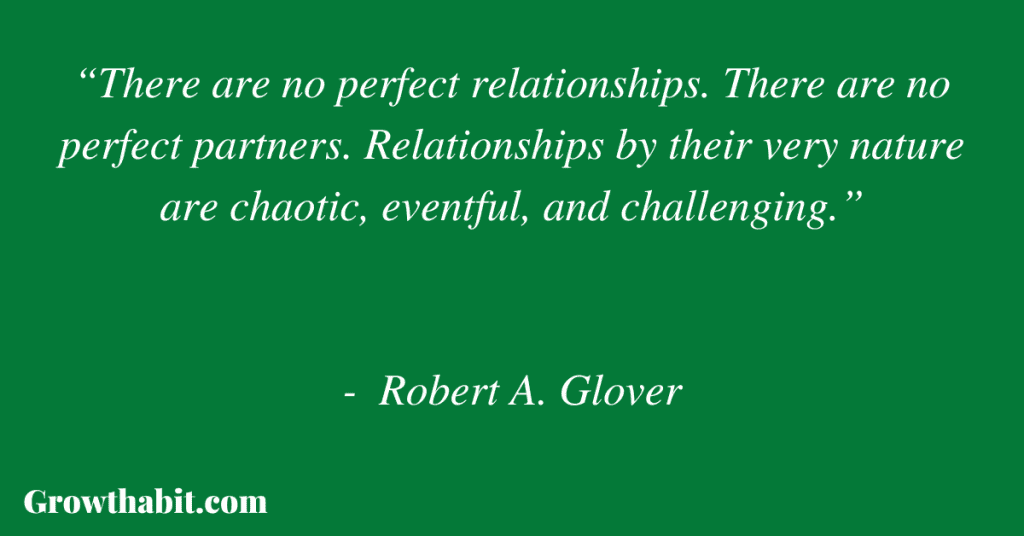
The integrated male is able to establish limits and is not frightened to persevere through the conflict that always arises.
And even if they are nervous about resolving a problem, they push through their anxiety and do it anyway. The author then challenges why it would appear sensible for a person to want to delete or hide certain qualities about himself and try to become something different.
He does this by asking “Why would it seem rational for a person to try to become something different?” Why do people insist on attempting to change who they are?
CHAPTER 2. The Making of a Nice Guy
In this chapter, the author explains that Nice Guys, when they are children, come into the world where their caregivers made them feel helpless.
Because of this, the dread of being abandoned is common among children.
If your parents divorced, one of your parents moved out, one of your parents died, or you were neglected, physically abused, or emotionally abused as a child, a good guy might have some amount of abandonment experience.
An abandoned youngster develops a self-centered personality. This indicates that they have a fundamental conviction that they are at the center of the universe and that everything else revolves around them.
Because of this, they are led to feel that they are solely responsible for everything that occurs in their lives.
Because of this, people conclude that there must be something wrong with them, and as a result, they don’t feel like they can be who they are as they are.
This is a toxic form of shame. Children who are abandoned may seek the acceptance of others as a means of coping with the humiliation they feel.
Their behaviors can take the form of an excessive pursuit of success, an excessive amount of working out, an attempt to fit in by creating drama, an attempt to be amusing, and an effort at pleasing others.
CHAPTER 3. Learn To Please the Only Person Who Really Matters
In this part, the author gives us an example of what the life of a Nice Guy looks like. Cal is a typical Nice Guy.
He maintains a constantly happy attitude, drives an attractive vehicle, dresses well, and is the proud parent of an adorable daughter in an effort to garner approval from others.
Cal likes to dress his 14-month-old daughter in a cute dress and take her to the park. From the moment he starts to dress her, he is unknowingly tying his worth and identity to the praise he thinks he will get for being a good dad.
A Nice Guy will almost always act in a way that is either deliberately or unintentionally planned to win someone’s approval or to protect himself from being disapproved of.
According to the author, one of the most crucial steps in overcoming the need for approval is to first recognize the actions that contribute to it and then learn how to break free from them.
CHAPTER 4. Make Your Needs A Priority
Nice Guys are typically more concerned with seeing to the requirements of others, all the while trying to present an image of being low maintenance for themselves. This is how good guys are because of how they were raised.
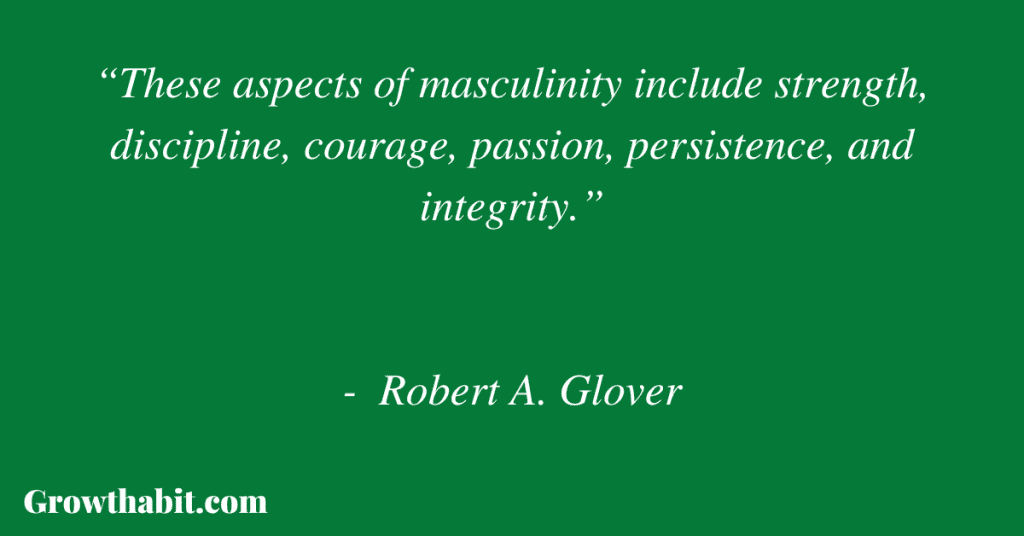
If a child’s wants are not satisfied in a timely and healthy manner, the kid may develop the mistaken belief that it is his needs that cause other people to hurt or forsake him.
Underneath their outward display of selflessness and selflessness for others, all decent guys are extremely needy.
As a consequence of this, Nice Guys can be indirect, unclear, manipulative, and controlling when they are attempting to get their needs met.
Now, let’s look at some of the things you do that get in the way of you having your needs satisfied.
One of them is making it harder for other people to contribute to you. When you had the greatest number of desires, you experienced the most amount of abandonment.
A Nice Guy might be under the impression that it was his demands that turned people off.
Therefore, they should make room for the assistance of other individuals in order to become a more integrated male and to have their requirements satisfied.
The second option is to make use of secret contracts. The Nice Guys Covert Contract goes as follows: “I will do something for you in exchange for you doing something for me. ”
However, both of us are going to act as though we are completely unaware of this agreement. Think about it for a second and try to come up with at least one example of a secret agreement that you have with someone you care about.
CHAPTER 5. Reclaim Your Personal Power
In this chapter, the author gives us 5 techniques to improve our self-esteem.
The first thing you need to do is establish some boundaries. Observe yourself for a predetermined amount of time and ask yourself this question: do you ever say yes when you’d rather say no?
Make it perfectly clear what you are willing to tolerate and what you are not willing to tolerate.
The second step is to let go of the things you are unable to manage.
The third step is to confront your anxieties head-on.
Number four is to build integrity.
Finally, communicate your emotions. You should genuinely confront your baggage and stop deflecting your attention away from yourself, your feelings, and your emotions in the present now.
The capacity for feeling is an essential component of being human. Recovering Nice Guys can start the process of letting go of a lifetime’s worth of needless baggage if they become fluent in the language of feelings.
CHAPTER 6. Reclaim Your Masculinity
In this chapter, dr. Glover shows that the absence of male role models during childhood is one factor that has contributed to the development of the problem of Nice Guys.
As a result of the Industrial Revolution, many fathers were forced to abandon their families in order to find employment in factories and offices, leaving their sons in the care of their mothers and other female relatives.
Because of their upbringing and social training, decent guys often find themselves socially isolated from other men.
A Nice Guy can fix this by surrounding himself with strong, male role models who can become your friends and from the ones you can learn.
CHAPTER 7. Get The Love You Want: Success Strategies for Intimate Relationships
Here, dr. Glover states that the majority of Nice Guys say that they did not have a close relationship with their father when they were growing up.
As a consequence of this, many Nice Guys were coerced into developing an unhealthy bond with their mother.
Because charming boys have a propensity to be monogamous to their mothers, it is significantly more difficult for them to have any kind of genuinely intimate relationship with a spouse once they reach adulthood.
Nice Guys often end up in relationships that are unhealthy for them. They try to counterbalance their anxiety of being vulnerable with their fear of being alone.
When someone is vulnerable, there is a possibility that another person will get too close to them and discover how terrible they are.
Nice Guys are under the impression that when others find out about this secret, those individuals will harm them, embarrass them, or abandon them.
The alternative does not appear to be preferable in any way. Reliving the dreadful feelings of abandonment they had as a child when they cut themselves off from other people is a recipe for disaster.
A kind guy needs assistance in order to find a healthy balance between his fear of being vulnerable and his fear of being abandoned.
He finds it in other individuals who have suffered similar wounds and struggle with their ability to be intimate.
Together, they co-create relationships that simultaneously irritate everyone involved and shield them from the fear of being exposed to the truth.
There are two categories of Nice Guys: those who enmesh and those who avoid.
Enmeshers are those who become excessively invested in a close personal relationship to the detriment of themselves and their other interests.
On the other hand, an avoider is a person who is emotionally unavailable to a primary partner while also performing the character of the Nice Guy outside of the relationship.
The question now is, how may one obtain the affection that they seek?
Now, what you need to do is establish some limits for yourself. When a recovering Nice Guy establishes boundaries with his partner, it provides the latter with a sense of safety and confidence.
In general, when women have a sense of security, they experience a sense of love.
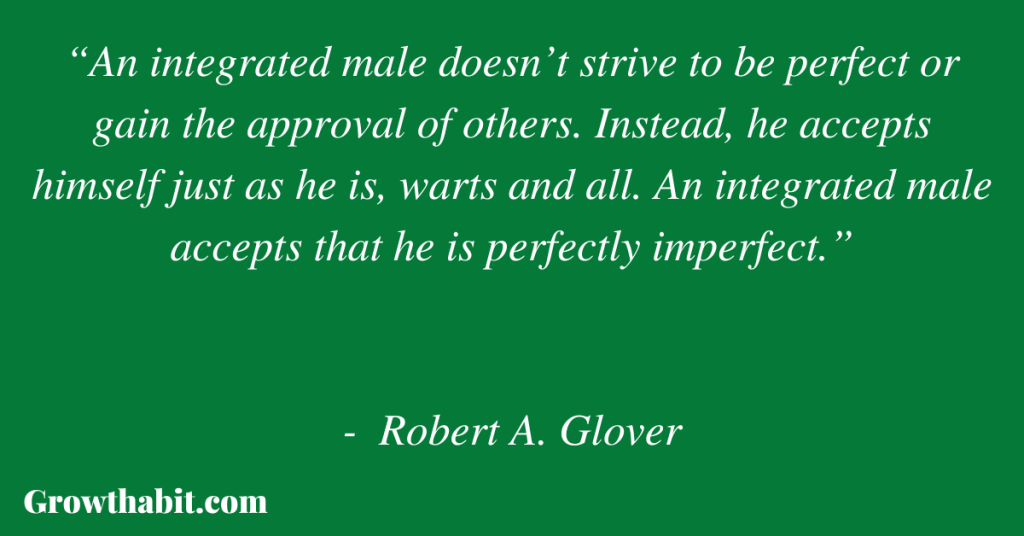
Creating respect also involves establishing boundaries. When a nice person fails to create clear limits for himself and his partner, it sends the message that the Nice Guy doesn’t genuinely respect himself.
The question then is why a woman would act in such a way.
CHAPTER 8. Get The Sex You Want: Success Strategies for Satisfying Sex
The first thing you need to do to obtain the sex you desire is to come out of the closet.
In other words, the most significant obstacles to a sexual life that is satisfying are feelings of internalized shame and fear.
The second step is to discuss the issue.
Find a location where you may communicate freely about your sexual past, including your earliest sexual memory, events you had as a child, sexual abuse, traumatic experiences, and sexual problems in your family.
And finally, the third step is to have sexual encounters with oneself without engaging in pornography or fantasizing.
You won’t be able to have healthy sex unless you are able to engage in sexual activity with yourself without resorting to pornography or fantasy in order to escape reality.
Pornography induces a hypnotic state in which the viewer is able to engage in sexual behavior while keeping their shame and fear at bay.
Pornography is a source of further guilt due to the fact that it is typically concealed. And disassociation can be achieved through the use of fantasy.
The act of dissociating one’s thoughts from one’s body is what this refers to.
Fantasy has no purpose other than to divert your attention away from your feelings of embarrassment and anxiety or to conceal the fact that you are engaging in inappropriate sexual behavior.
Number four, refuse to engage in risky sexual behavior. When you make the decision that you will no longer accept anything less than satisfying sexual experiences, you will start to take responsibility for changing your behavior in some way.
You will let go of the idea of being a great lover, and you will work on being open and honest in your communication.
You will choose a partner who is available, and you will conclude that having poor sex is not preferable to having none at all.
And finally, take a lesson from the bull moose. In nature, the alpha male and the bull moose don’t sit around trying to figure out what will make the females to like them.
They are proud of who they are and what they do, which makes them aggressive, strong, competitive, and sexually confident.
This is why they do what they do. After that, the women will be very interested.
CHAPTER 9. Get The Life You Want: Discover Your Passion and Purpose in Life, Work, And Career
Stop trying to please other people; this is the single most crucial step you can take.
Put your needs ahead of everyone else’s. You can reclaim your personal power by confronting your fears, building integrity, creating boundaries, and expressing your feelings.
You can also do this by giving up control over things you can’t manage.
Establish friendships with strong, manly men who can serve as role models. Obtain the love that you seek.
Nice Guys who are terrified of opening up to a partner but also afraid of being alone, therefore it’s rarely pleasant for them to create boundaries because both of these fears make them uncomfortable.
You can get the one by discussing it in a secure setting with a group of other males.
Figure out how to have sexual encounters with yourself without resorting to pornography or fantasy.
Just say no to risky sexual behavior and stay rooted in who you are. And ultimately achieve the life you desire by conquering your fears.
Most Important Keywords, Sentences, Quotes
CHAPTER 1. The Nice Guy Syndrome
“In general, people are not drawn to perfection in others. People are drawn to shared interests, shared problems, and an individual’s life energy.
Humans connect with humans. Hiding one’s humanity and trying to project an image of perfection makes a person vague, slippery, lifeless, and uninteresting.”
“There are no perfect relationships. There are no perfect partners. Relationships by their very nature are chaotic, eventful, and challenging.”
“Just about everything a Nice Guy does is consciously or unconsciously calculated to gain someone’s approval or to avoid disapproval.”
CHAPTER 2. The Making of a Nice Guy
“Relationships are messy and there is no way to eliminate the bumps and potholes, but we don’t have to make them any more difficult than they already are.”
“When our god fails to respond in the ways we expect, we humans tend to respond in one of two ways.
We either blindly intensify our acts of worship or lash out in righteous anger.”
“List one fear that has been controlling your life. Once you decide to confront the fear, begin repeating to yourself, “I can handle it.
No matter what happens, I will handle it.” Keep repeating this mantra until you act and stop feeling fear.”
CHAPTER 3. Learn To Please the Only Person Who Really Matters
“These aspects of masculinity include strength, discipline, courage, passion, persistence, and integrity.”
“As a result of this dependency, every child’s greatest fear is abandonment. To children, abandonment means death.
“Do you believe that people can see your human imperfections and still love you?
How would you be different if you knew the people who care about you would never leave you or stop loving you — no matter what?”
CHAPTER 4. Make Your Needs A Priority
“In many ways, humans aren’t much different from pets. People often behave the way they have been trained to behave.
For example, if a person gives his dog a treat when he pisses on the carpet, the dog will keep pissing on the carpet. The same is true for humans.
If the Nice Guy reinforces his partner’s undesirable behaviors, she will keep behaving in undesirable ways.”
CHAPTER 5. Reclaim Your Personal Power
“Surrendering Helps Nice Guys Reclaim Their Personal Power Ironically, the most important aspect of reclaiming personal power and getting what one wants in love and life is surrender.
Surrender doesn’t mean giving up, it means letting go of what one can’t change and changing what one can. Letting go doesn’t mean not caring or not trying. Letting go means letting be.
It is like opening up a tightly clenched fist and releasing the tension stored inside. At first the fingers will want to return to their former clenched position.
The hand almost has to be retrained to open up and relax. So it is with learning how to surrender and let go.”
“I define personal power as a state of mind in which a person is confident, he can handle whatever may come.
This kind of power not only successfully deals with problems, challenges and adversity, it actually welcomes them, meets them head on, and is thankful for them.
Personal power isn’t the absence of fear. Even the most powerful people be afraid. Personal power is the result of feeling fear, but not giving in to the fear.”
CHAPTER 6. Reclaim Your Masculinity
“I define masculinity as that part of a man that equips him to survive as an individual, clan, and species.
Without this masculine energy we would have all become extinct eons ago.
Masculinity empowers a man to create and produce. It also empowers him provide for and protect those who are important to him.”
“Fathers need to take their sons hunting and fishing, work on cars with them, take them to work, coach their teams, take them to ball games, work out with them, take them on business trips, and let them tag along with them when they go out with the guys.
All of these activities help boys move successfully into the male world. This process is not just limited to a man’s biological sons.
Nice Guys can get involved with young relatives, scouts, sports teams, school activities, or big brothers.”
CHAPTER 7. Get The Love You Want: Success Strategies for Intimate Relationships
“Surrender allows recovering Nice Guys to see each life experience as a “gift” from the universe to stimulate growth, healing and learning.
Instead of asking, “Why is this happening to me?” the recovering Nice Guy can respond to life’s challenges by pondering, “What do I need to learn from this situation?”
“An integrated male doesn’t strive to be perfect or gain the approval of others. Instead, he accepts himself just as he is, warts and all. An integrated male accepts that he is perfectly imperfect.”
CHAPTER 8. Get The Sex You Want: Success Strategies for Satisfying Sex
“Toxic shame is the belief that one is inherently bad, defective, different, or unlovable.
Toxic shame is not just a belief that one does bad things, it is a deeply held core belief that one is bad.”
“The very thing that has sex so exciting is exactly what makes it so terrifying.
Sex is powerful, chaotic, and wild. It crackles with cosmic energy. It draws us like a moth to a flame.
As recovering Nice Guys release their sexual shame and fear, take responsibility for their own pleasure, refuse to settle for bad sex, and practice being just who they are, they put themselves in the position to embrace this cosmic force without fear or reservation.
This is when the sex really gets good.”
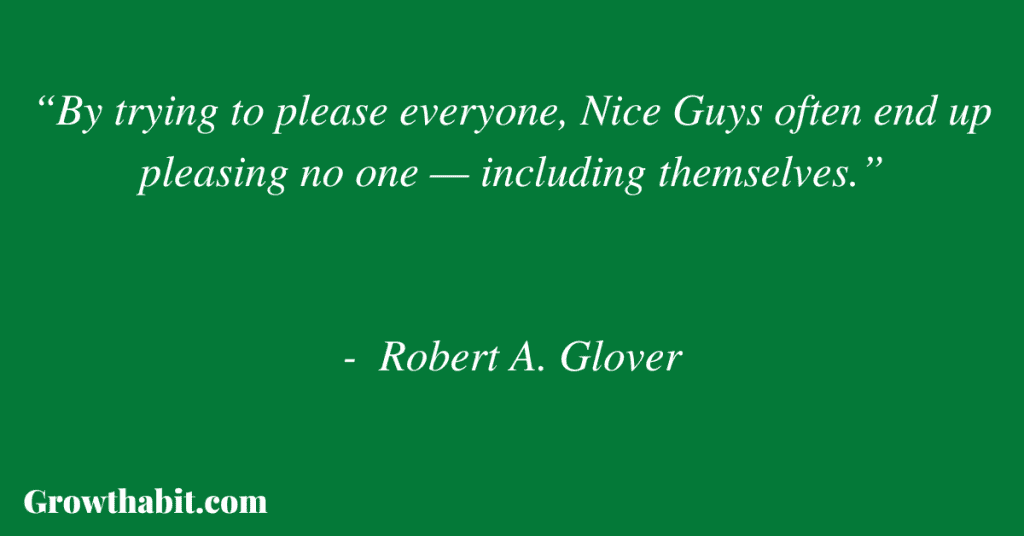
“Good sex consists of two people taking full responsibility for meeting their own needs. It has no goal.
It is free of agendas and expectations. Rather than being a performance, it is an unfolding of sexual energy. It is about two people revealing themselves in the most intimate and vulnerable of ways.
Good sex occurs when two people focus on their own pleasure, passion, and arousal, and stay connected to those same things in their partner.
All of these dynamics allow good sex to unfold in unpredictable, spontaneous, and memorable ways.”
CHAPTER 9. Get The Life You Want: Discover Your Passion and Purpose in Life, Work, And Career
“By trying to please everyone, Nice Guys often end up pleasing no one — including themselves.”
“Decisions are now made by one individual, rather than by a committee. He no longer has to mind read, predict, or try to please multiple voices with conflicting agendas.
When putting himself first all the information he needs to decide is within him: “Is this what I want? Yes. Then that’s what I’ll do.”
“Interestingly enough, when Nice Guys take responsibility for their own needs and make them a priority, those around them benefit too.
Gone are the covert contracts, the guessing games, the anger outbursts, and passive-aggressive behavior. Gone are the manipulation, the controlling behavior, and the resentment. I learned this lesson first-hand a few years back.”
“Being integrated means being able to accept all aspects of oneself. An integrated man is able to embrace everything that makes him unique: his power, his assertiveness, his courage, and his passion, as well as his imperfections, his mistakes, and his dark side.”
Book Review (Personal Opinion):
No More Mr. Nice Guy does an excellent job of highlighting the common issues that people face when they are unsatisfied with their relationships and wish to improve them.
Essentially, anyone can be a “nice guy” who prioritizes the acceptance of others over his or her own needs. This breeds anger, discontent, and dissatisfaction throughout the organization.
This book also provides excellent suggestions on how to become a more “integrated” person in simple, doable stages.
Finally, I highly suggest this book for both men and women who want to understand the individuals in their lives who have people-pleasing tendencies and how to deal with them in order to have more rewarding relationships.
This Book Is For:
- Men who want to learn how to be more assertive and confident.
- Men who need to know how to prioritize their own needs.
- Men that feel trapped in unfulfilling sexual patterns
If You Want to Learn More
Here is a podcast with author Dr. Robert Glover where he talks about overcoming the Nice Guy syndrome. Overcoming Nice Guy Syndrome | Dr. Robert Glover.
How I’ve Implemented the Ideas from The Book
There are a lot of lessons from this book that I already knew, but seemed to have forgotten over the years. And reading the book made me remember the essential lessons of becoming a fully integrated male. I’m back on track!
One Small Actionable Step You Can Do
This book’s central idea is benevolent selfishness. The first thing you can do is consider what is important to you. Take charge of the only thing you truly have power over: yourself.
Speak up for yourself. Take good care of yourself (you’re worth it). Help others for yourself, if that’s the person you want to be, not because you believe they’ll think better of you.
Learn to offer without expecting anything in return. Ask for what you want because, despite how obvious it may appear to you, most people have no idea what you want or how their actions and treatment of you affects you favorably or adversely.
Don’t be afraid to ask for what you want. If you’re willing to do it for someone else, they’re likely to do it for you.
